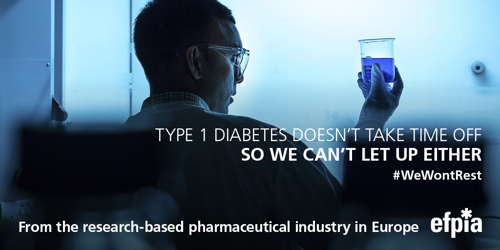#WeWontRest in the fight against diabetes
08.05.19
One of the humbling aspects of our job at EFPIA is that we have the opportunity to hear from patients about what they are going through and what they expect from our industry. In an era when we are increasingly focused on outcomes that matter to patients, these interactions are especially valuable and they fuel our determination to get it right for patients.
What I hear from people with diabetes falls into two main categories. On the one hand, there are fears about long-term complications – about dying from cardiovascular disease, suffering a loss of a limb, vision impairment and more. This translates into bigger personal questions about how long they can hope to live and live well and whether they will see their children grow up or their grandchildren go to school.
The other concerns are short-term and equally serious: ‘What if my sugar levels are too high or too low?’ ‘What if I have a hypo?’(an event of low blood sugar that can be fatal).
What strikes me about the latter type of concern is that the conversation moves beyond clinical issues very quickly. One of the biggest challenges for people living with diabetes is the sheer burden of managing their diseases within day to day life; the endless measurement, the injections, the planning. It’s the thinking that exhausts people. There’s no holiday from diabetes; no time-out; no pause button.
That is why I am delighted to see that a number of EFPIA member companies have come together to launch the EFPIA Diabetes Platform with a simple aim: To be an active partner in the fight against diabetes, improving the lives of everyone affected by the disease.
The Platform will work to enhance recognition of the value of innovation in diabetes; contribute to the sustainability of financing diabetes management for the future; and improve health outcomes in diabetes management.


At the heart of this effort is the wider shift towards outcomes-based healthcare. By focusing on the outcomes that people living with diabetes value, we can deliver value for society. This is reflected in the standard set of diabetes outcomes published by the International Consortium on Healthcare Outcome Measurement (ICHOM). In addition to glycaemic control and hypoglycaemia, it includes depression and diabetes distress – issues that have a meaningful impact on the lives of patients, issues that also matter to patients.
The urgency surrounding diabetes cannot be overstated. It is, without question, one of the biggest health and socio-economic challenges of our time. Nearly 1 out of 10 people in Europe have diabetes, amounting to around 60 million people(1). By 2045 this number is expected to increase by 22% to 81 million people.
Think about that for a moment. Of the 30 kids sitting in a classroom today, three or four will have diabetes later in life. This will take its toll on their lives and put strain on health systems.
Diabetes care accounts for around 9% of total health spending in the EU and is set to rise to 12% over the next 25 years(2). Access to care and to the latest treatment varies widely across Europe – an issue that we are committed to addressing together with other leaders in the field.
Tackling this pandemic demands collaboration, research and continued commitment to innovation. Over the past four decades, this approach has delivered better quality of life and better outcomes and we need to step up our efforts to meet the scale of the challenge we face.
The launch of the EFPIA Diabetes Platform is our latest contribution to addressing this challenge and it just one part of our efforts to beat the disease. #WeWontRest until diabetes is defeated.
(1) IDF Diabetes Atlas Eight Edition, International Diabetes Federation 2017
(2) Solomon et al. Diabetes Care 2017; 40: 412-418
